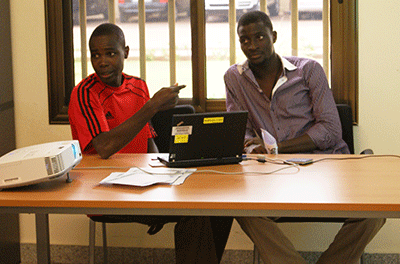Budget data that is open and easy-to-read allows people to know how and where governments spend their money, and can be used by citizens, civil society, academia, parliamentarians, and the media to participate in government’s decision-making around budgets to help make them more responsive to peoples’ needs.
To succeed in pushing for citizen participation and government responsiveness, one needs champions like Mongo Aharh-Kpessou, permanent secretary in charge of policy reforms and financial programs in Togo’s Ministry of Finance. “We consider the open budgets platform a natural extension of our national budget database, which is already available online, and we expect this initiative to contribute to the dialogue between the government of Togo and non-state actors on budget allocations and the efficiency of spending," he said.
This dialogue may not take too long to happen. Sylvestre Djokey, a Togolese economic journalist, relies on the website to keep his readers informed about government’s spending. “I visit togoreforme frequently, and that is where I get most of the economic information and data that we publish,” he said.
The tool also has merits for government budget officers – it has helped them improve the quality of their budget preparation, reporting and analysis, and has made these tasks easier to perform.
Togo is one of the smallest African nations with about 59% poverty. It was also the first fragile state to open its expenditure data to public scrutiny using BOOST. Increasing public participation in budget information can help a government be more efficient and targeted in its spending, and reflect the voices of its people in its spending decisions.
Across the world is Moldova – a small, landlocked nation of 3.6 million, situated between Romania and Ukraine. It is also one of the first developing countries to have launched an Open Data portal, in May 2011 – opening its public expenses and other types of data in reusable formats. Now Moldova’s Open Data portal houses more than 700 databases.
In Moldova, this was a government initiative, in response to concerns about accountability, transparency, corruption, and inefficient spending of public money, and the government rose to the challenge by taking the nation’s key policy document from behind the counters and putting it up for everyone’s use, monitoring, and participation to help improve public spending and the lives of the poor.
Victoria Vlad is an economist at the EXPERT-GRUP, an independent think tank based in Chisinau, specializing in economic and policy research. She and her colleagues work with BOOST and other open data, monitoring and analyzing trends in government spending and translating that information into visualizations that are easy for people to understand. Under their new BudgetStories.md innovative project, EXPERT-GRUP has so far developed 13 infographics on the largest spending sectors, such as education, agriculture, public administration, and health.
“Our analysis showed that for three out of four levels of education, the average number of students has gone down dramatically in the last decade with little effect on budget allocations,” Vlad said. “We’ve looked at these findings next to spending data and made a case for the need for more efficient spending in education.” The Ministry of Education factored the analysis into its 2020 Education strategy.
There have been more than 130 news items in the media covering the results of the think tank’s analyses and helping spread the information to citizens. “With the BudgetStories, we aim to inform the public on how money is spent, and create interest in our audience to dig deeper into the data, and make their own stories. Our media partners have helped us reach thousands of readers,” Vlad said.

